
Many people think that mathematics is a human invention. To this way of thinking, mathematics is like a language: it may describe real things in the world, but it doesn’t “exist” outside the minds of the people who use it.
But the Pythagorean school of thought in ancient Greece held a different view. Its proponents believed reality is fundamentally mathematical.
More than 2,000 years later, philosophers and physicists are starting to take this idea seriously.
As I argue in a new paper, mathematics is an essential component of nature that gives structure to the physical world.
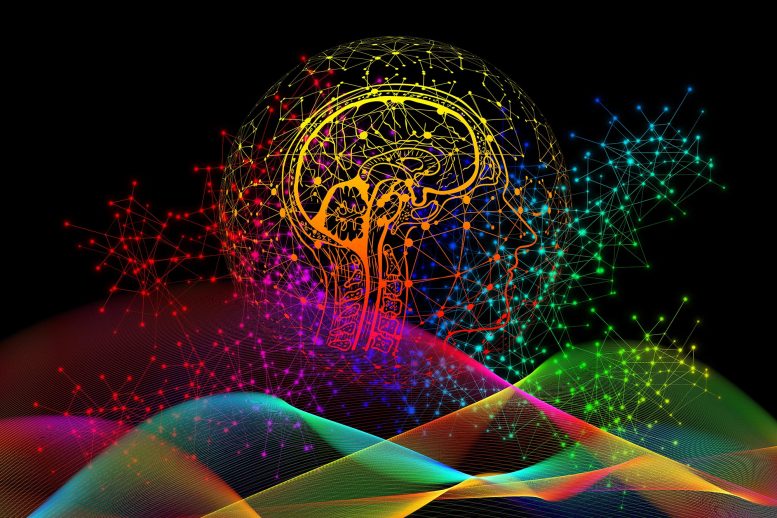
Honeybees and hexagons
Bees in hives produce hexagonal honeycomb. Why?
According to the “honeycomb conjecture” in mathematics, hexagons are the most efficient shape for tiling the plane. If you want to fully cover a surface using tiles of a uniform shape and size, while keeping the total length of the perimeter to a minimum, hexagons are the shape to use.
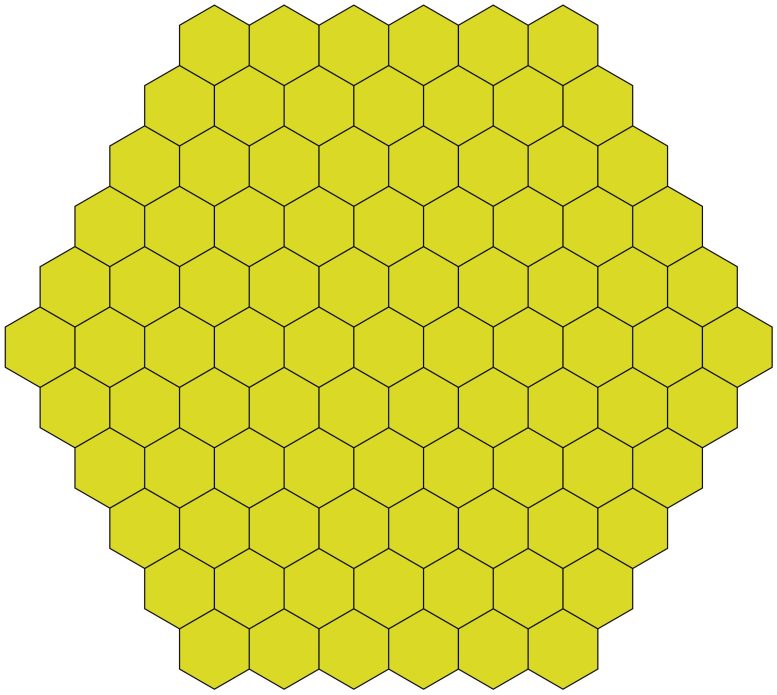
The hexagonal pattern of honeycomb is the most efficient way to cover a space in identical tiles. Credit: Sam Baron
Charles Darwin reasoned that bees have evolved to use this shape because it produces the largest cells to store honey for the smallest input of energy to produce wax.
The honeycomb conjecture was first proposed in ancient times, but was only proved in 1999 by mathematician Thomas Hales.
Cicadas and prime numbers
Here’s another example. There are two subspecies of North American periodical cicadas that live most of their lives in the ground. Then, every 13 or 17 years (depending on the subspecies), the cicadas emerge in great swarms for a period of around two weeks.
Why is it 13 and 17 years? Why not 12 and 14? Or 16 and 18?
One explanation appeals to the fact that 13 and 17 are prime numbers.

Some cicadas have evolved to emerge from the ground at intervals of a prime number of years, possibly to avoid predators with life cycles of different lengths.
Imagine the cicadas have a range of predators that also spend most of their lives in the ground. The cicadas need to come out of the ground when their predators are lying dormant.
Suppose there are predators with life cycles of 2, 3, 4, 5, 6, 7, 8 and 9 years. What is the best way to avoid them all?
Well, compare a 13-year life cycle and a 12-year life cycle. When a cicada with a 12-year life cycle comes out of the ground, the 2-year, 3-year and 4-year predators will also be out of the ground, because 2, 3 and 4 all divide evenly into 12.
When a cicada with a 13-year life cycle comes out of the ground, none of its predators will be out of the ground, because none of 2, 3, 4, 5, 6, 7, 8 or 9 divides evenly into 13. The same is true for 17.
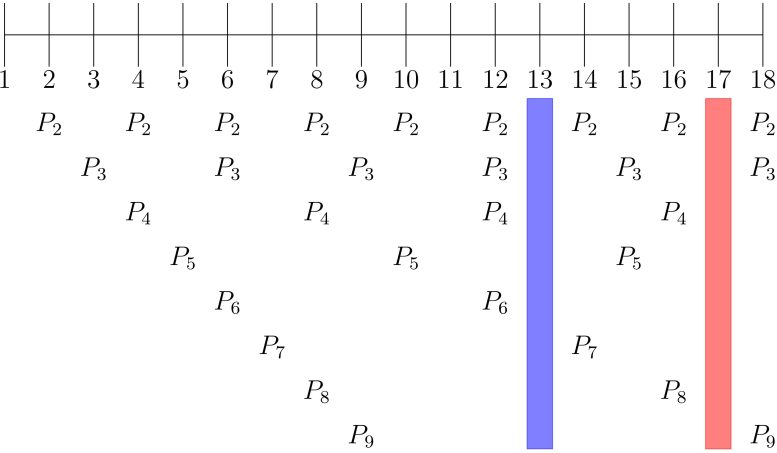
P1–P9 represent cycling predators. The number-line represents years. The highlighted gaps show how 13 and 17-year cicadas manage to avoid their predators. Credit: Sam Baron
It seems these cicadas have evolved to exploit basic facts about numbers.
Creation or discovery?
Once we start looking, it is easy to find other examples. From the shape of soap films, to gear design in engines, to the location and size of the gaps in the rings of Saturn, mathematics is everywhere.
If mathematics explains so many things we see around us, then it is unlikely that mathematics is something we’ve created. The alternative is that mathematical facts are discovered: not just by humans, but by insects, soap bubbles, combustion engines and planets.
What did Plato think?
But if we are discovering something, what is it?
The ancient Greek philosopher Plato had an answer. He thought mathematics describes objects that really exist.
For Plato, these objects included numbers and geometric shapes. Today, we might add more complicated mathematical objects such as groups, categories, functions, fields and rings to the list.
Plato also maintained that mathematical objects exist outside of space and time. But such a view only deepens the mystery of how mathematics explains anything.
Explanation involves showing how one thing in the world depends on another. If mathematical objects exist in a realm apart from the world we live in, they don’t seem capable of relating to anything physical.
Enter Pythagoreanism
The ancient Pythagoreans agreed with Plato that mathematics describes a world of objects. But, unlike Plato, they didn’t think mathematical objects exist beyond space and time.
Instead, they believed physical reality is made of mathematical objects in the same way matter is made of atoms.
If reality is made of mathematical objects, it’s easy to see how mathematics might play a role in explaining the world around us.
In the past decade, two physicists have mounted significant defenses of the Pythagorean position: Swedish-US cosmologist Max Tegmark and Australian physicist-philosopher Jane McDonnell.
Tegmark argues reality just is one big mathematical object. If that seems weird, think about the idea that reality is a simulation. A simulation is a computer program, which is a kind of mathematical object.
McDonnell’s view is more radical. She thinks reality is made of mathematical objects and minds. Mathematics is how the Universe, which is conscious, comes to know itself.
I defend a different view: the world has two parts, mathematics and matter. Mathematics gives matter its form, and matter gives mathematics its substance.
Mathematical objects provide a structural framework for the physical world.
The future of mathematics
It makes sense that Pythagoreanism is being rediscovered in physics.
In the past century, physics has become more and more mathematical, turning to seemingly abstract fields of inquiry such as group theory and differential geometry in an effort to explain the physical world.
As the boundary between physics and mathematics blurs, it becomes harder to say which parts of the world are physical and which are mathematical.
But it is strange that Pythagoreanism has been neglected by philosophers for so long.
I believe that is about to change. The time has arrived for a Pythagorean revolution, one that promises to radically alter our understanding of reality.
Written by Sam Baron, Associate professor, Australian Catholic University.
This article was first published in The Conversation.![]()


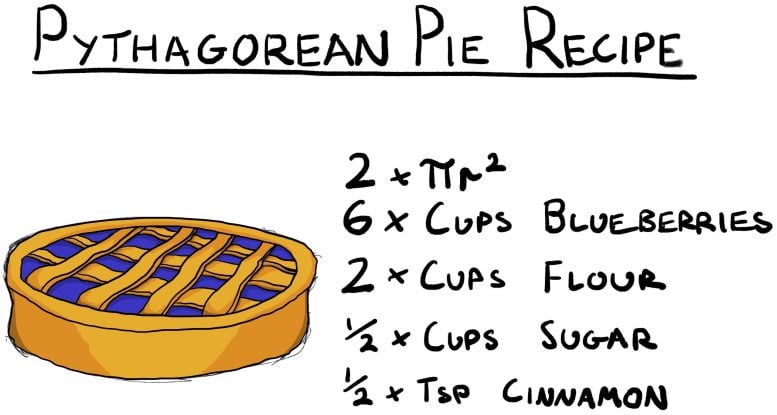


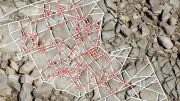

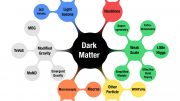
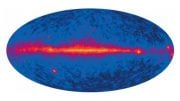


I’ve stated this for 45 years and complained Stephen Hawking was a moron for wanting Alien life connection and his atheist beliefs.
First: Aliens will come to destroy and take our natural resources which are galactically rare.
Second: Mathematics existed in the abyss before anything thought or solid to measure.
In essence:
How does one create a pie without ever seeing a pie, blueberry, sugar, flour, water, milk? Mathematics existed before anything solid thought or measured!
I.E. Oh Mighty GOD!
You complain that Hawking is a moron, but your own writing is full of logical holes. You imagine certain things, and then you assume those are true. The universe has no obligation to adhere to your imaginings.
“Mathematics explains so much of the world around us. Therefore it’s not invented.”
Sorry, but that doesn’t follow.
Plus mathematics interprets, describes the world; doesn’t ‘explain’ it!
Dream on, egomaniacs!
Two connotations of the word discovery are conflated in this essay: non-conscious matter does not discover mathematical relationships in the way that Pythagorus did.
Most of the laws that humans have discovered about the universe admittedly do fit equations with fairly small dimensionality, but it’s premature to declare that the universe operates only by rules that are comprehensible to human minds. Consider that Newtons’ Laws required Einsteins relativity to describe more closely the true state of the relationships between objects, but as yet, no strong theory includes quantum phenomena. There is no explanation why certain physical relationships have the “finely tuned” values that they do, tiny alterations from which would have yielded a lifeless universe. It is simply not guaranteed that the universe is mathematically definable and comprehensible by human beings.
Thus, it’s not at all reasonable for the author to conclude that mathematical objects provide a framework for the world.
You are right that “it’s premature to declare that the universe operates only by rules that are comprehensible to human minds”, and you’re also right in saying that the claims in this article are premature – but there are two reasons why we should have high confidence that fundamental laws of the universe are based on mathematics.
1. It’s true as you say that Newton’s laws had to be modified by Einstein’s, and we know that Einstein’s laws will have to be modified still to account for physics inside black holes, but the trend is fairly strong. Even 500 years ago we knew nothing about any of physical laws, and that time it was reasonable to assume a mysterious universe. But the last few centuries removed many mysteries, and in each case the universe obeyed some mathematical laws. It is reasonable to assume that the trend will continue.
2. The currently discovered coarse laws are mathematical. It would be highly unusual if the underlying refined laws are non-mathematical. For example, Einstein’s laws couldn’t be non-mathematical since then Newton’s laws which come out of that wouldn’t be mathematical. There is a possibility that the underlying laws are whimsical but that effect is subsumed by mathematics – somewhat like what happens in quantum mechanics – but then those effects must be describable by probabilities. That’s still mathematical. A deterministic world is mot necessary for it to be describable by mathematics. We just need there to be some rhyme or reason.
If there are laws that can’t be comprehended by the human mind then that must be proved. And if it is so then it is not possible to discuss them.
It’simple. 🙂
Your mind observes the world, reality, etc. You cannot prove anything exists without the mind.
Also, mathematics is mind created.
So, it’s natural for mind created mathematics to explain mind observed world, reality, etc.
I would argue that nature is what it is. It is going to behave the way it behaves, regardless if humans know how these behaviorial mechanisms work, or not. Mathematics is (it can be, but does not have to be) used as a language for us humans to measure these behaviors, physics. There are phenomena we dont underatand, either because someone has not defined a way to do so, mathematically, or we just didn’t know it existed. You don’t know what you do not know. But, It’s still happening! There could be an alien civilization that uses sticks & stones(or whatever) to measure what we are already measuring with mathematics. I can underatand the debate on this topic, it almost creates circular logic. Nature was here first, we just invented a clever way to measure what is happening.
Is there ‘room’in this comment section for a senior man of minimal formal education who never read a single book?? ( but wrote a book )
Quantum Mechanics seems to suggest that nature randomly does whatever she wants when we’re not looking. Mathematics’ most beloved question (“what does this look like in higher dimensions?”) demonstrates our ability to dream up stuff that, while perhaps rooted in nature, is not necessarily natural… (although, having an answer to higher dimensions in nature – perhaps never needing to go beyond something expressable as octonions is… interesting).
“Mathematics -the abstract science of number, quantity, and space.” -Oxford Languages.
The universe appears to operate according to stable laws of causality, are inherent to the universe. These laws operate independently of whether they are understood by any rational mind, except perhaps for the Mind that created the laws.
Mathematics is the rational study of a portion of those laws that pertain to “number, quantity, and space”, if we accept the Oxford definition. Mathematics is a formal language used to reason abstractly about reality, and this language is understandable to man because it is invented by man. The logical truths which mathematics uncovers are facts of the universe, but the mathematical language is pure human invention.
So, facts are discovered, and mathematics may help us discover them. But mathematics itself is an invention.
If this Pythagorian nonsense were true, we would have closed our laboratories and relied solely on mathematics for our discoveries. The truth is that mathematics is a descriptive language. A deck of cards can be made to fall in a billion ways, and these billion patterns can each be described by a mathematical formula. The world,i.e. reality, is no more mathematical than it is Russian, Chinese, Swahili, or any other language we choose. So much for descriptions, whether they are a symbolic language or a natural language.
Mathematic is a tool like ruler . Step 1 we separate the world
Step 2 choose name for all separated things
Step 3 Counting them
Step 4 finde Relation
Step 5 naming the Relation
Step 6 write this Article
In fact things have Relation together
Mathematic can’t make something like pi but it’s exist
We can have another Mathematics based on pi it just need separated pi and naming counting
We are don’t have Mathematics for quantom yet but we can make
Mathematics is the language we invented to help us gain a better understanding of not just the world, but the entire universe. Using it, we have developed incredible breakthroughs in science, technology, and medicine; to mention just a few areas. Bluntly put, the language of mathematics may be the greatest tool we have ever developed, because of the insight it gives us into the inner workings of the entire universe – not just because of all the technological marvels that would not be possible without mathematics.
While our understanding is far from complete, mathematics has allowed us to expand our vision of the Universe in ways that our ancestors never could have imagined.
It’s still evolving as a language even now. Every real world observation we make that is different from the calculated prediction, allows us to refine our math so that we can improve our predictions and develop an ever more complete understanding of the Universe.
We may never fully understand everything but without mathematics we would probably not have gone far beyond the hunter-gatherer stage in our evolution.
Physics and Mathematics are radical branch of each other.
As all galaxies evolved from an unique Singularity,the big bang.
Secondly,matter in galaxis accompanied with expansion exchange energies abided by certain laws carring out physical change.
Final feature is homogeneity of matter contained everywhere in all galaxies.
Hence,fact is obvious that Pythagorean mathimatics is menifested automticly to stars and black holes in galaxies.But,safely one can say its measurement for proof is not practical in Universe due to its vastness.
The Galaxies have evolved from one Singularity known as Big Bang.Constituent matters in all the galaxies are homogeneous every where in the passage of time.Energy is exchanged within matters of differen galaxies abided by certsin laws.So,Pythagorean mathematics though reflected in matters in real Universe is hard to verify due to large vastness.
Mathematics was discovered, yes.
But proofs were invented.
Nonsense! Honey bees do not know calculus nor do cicadas know how to count. Mathematics is a HUMAN invention. You will notice that while calculus may explain the behaviour of an object in a gravitational field it does not explain WHY gravity exists. We are no closer to knowing why than Newton was. Mathematics may predict (which is it’s only function), it does not lend to understanding.
It’s easy to say Pythagoras is right when you only use math from ancient to Enlightenment times. Pure math since the 19th century is not based on physical world. What is a real world non measurable function? Spaces without right angles? Infinitely greater number of infinite real numbers than infinite integers?
… we could use different number system, but the things would stay the same…
lets put this straight once and for all:
although all is ruled by math, the way to describe it is entirely human invented, and the likely reason it fails to describe all.
I work in 3d environments. I am almost certain Pandora in the movie avatar is not reality. Just a guess though. Btw The article isn’t science actually and has zero to do with actual science. More of a late night discussion after consuming large quantities of alcohol or consuming magic mushrooms and hanging out at a camp fire on the beach. Confused.
Nick Fraser: “Nonsense! Honey bees do not know calculus nor do cicadas know how to count.”
Fortunately for them, their predators are even further math-challenged!